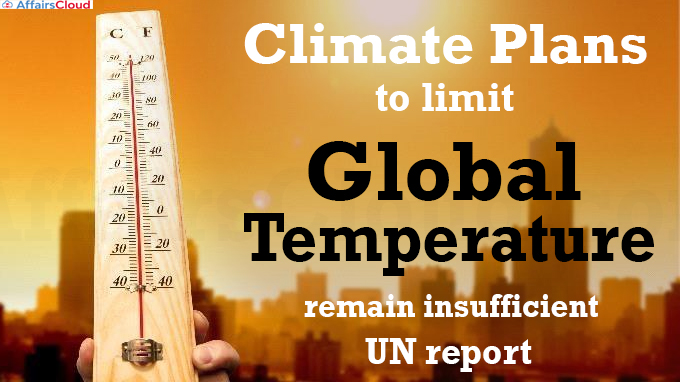 The United Nations Framework Convention on Climate Change (UNFCCC) in its ‘NDC Synthesis Report 2022’, issued a warning that the climate plans of governments around the world are still insufficient to keep global warming to 1.5 degrees Celsius (1.5°C), as mandated by the 2015 Paris Agreement.
The United Nations Framework Convention on Climate Change (UNFCCC) in its ‘NDC Synthesis Report 2022’, issued a warning that the climate plans of governments around the world are still insufficient to keep global warming to 1.5 degrees Celsius (1.5°C), as mandated by the 2015 Paris Agreement.
- According to the report, the combined climate pledges of the 193 parties to the Paris Agreement could put the world on course for about 2.5°C of warming by the end of the century.
Background
i.The Nationally Determined Contributions (NDCs), or climate action plans, of 193 Parties to the Paris Agreement were examined by the UNFCCC (UN Climate Change).
- It included updated or new NDCs submitted by 24 nations following the UNFCCC Conference of the Parties (COP 26) in Glasgow (Scotland) until September 23, 2022.
- The 24 countries include Bolivia, Vanuatu and Uganda, as well as the large emitter nations of India and Indonesia.
- The major emitters have committed to cut emissions by at least 31.89% by 2030.
ii.The plans cover 94.9% of all Greenhouse Gas (GHG) emissions worldwide in 2019.
Note: The UNFCCC COP 27 will be held from November 6 to 18, 2022, in Sharm el-Sheikh, Egypt.
Key Concerns of the Report:
i.The report estimates that, compared to 2010 levels, current commitments will result in a rise in emissions of 10.6% by 2030.
- This is a development over the 2021 assessment, which projected that countries were on track to raise emissions by 13.7% by 2030 compared to 2010 levels.
- The 2021 analysis revealed that estimated emissions would continue to rise after 2030.
ii.With temperatures 1.2°C above pre-industrial levels, the earth is already experiencing climate-related storms, heatwaves, and floods, and is still far from making the world on track to a 1.5°C temperature.
iii.National governments must enhance their climate action plans and implement them over the next eight years to keep the 1.5°C target viable.
- To achieve the target of the Paris Agreement, emissions must decrease by 43% by 2030 when compared to 2010 levels.
iv.According to the 2022 analysis, emissions will stop increasing after 2030.
v.According to the UN Intergovernmental Panel on Climate Change (IPCC) 2018 report, CO2 emissions must be reduced by 45% by 2030 compared to 2010 levels.
UNFCCC Report on Long-Term Low-Emission Development Strategies
The UNFCCC report on Long-Term Low-Emission Development Strategies, which was also published, examined how various nations intended to achieve net-zero emissions by or about 2050.
- According to the report, if all long-term strategies are fully implemented on time, these countries’ GHG emissions may be around 68% lower in 2050 than in 2019.
Recent Related News:
i.In August 2022, the Union Cabinet chaired by the PM Narendra Modi, has approved India’s updated Nationally Determined Contribution (NDC) to be communicated to the UNFCCC.
ii.PM Narendra Modi announced stepping up India’s climate action through five nectar elements known as “Panchamrit” at the COP26 to the UNFCCC, held in Glasgow, United Kingdom, in November 2021.
About United Nations Framework Convention on Climate Change (UNFCCC):
i.The UNFCCC came into force on March 21, 1994. The 198 countries that have ratified the Convention are known as Parties to the Convention.
ii.The UNFCCC is a “Rio Convention,” one of two presented for signature at the 1992 Rio Earth Summit.
- The UN Convention on Biological Diversity (UNCBD) and the UN Convention to Combat Desertification (UNCCD) are sister conventions to the Rio Convention.




